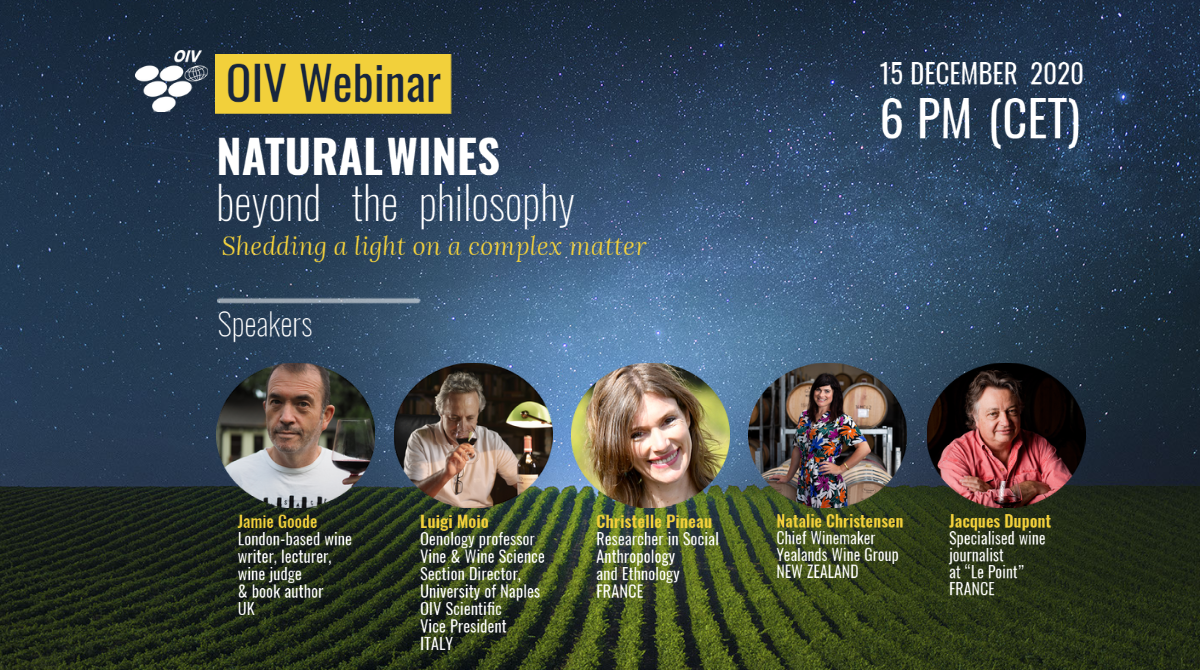The round-table webinar, moderated by the OIV’s Oenology Head of Unit, Guido Baldeschi, gathered 5 international speakers, with different profiles and wealth of experience in the wine sector. Check here the speakers bio.
The webinar confirmed that the topic of natural wines raises long debates, if only on the terminology to be used, especially when comparing them to other types of wine. Conventional wines? Unconventional wines? Traditional wines? Natural wines? Classic wines? The opinions of the wine sector community differ as to the appropriate terminology to use.
For the sake of convenience, during the webinar, the OIV chose to contrast “Natural wines” with “Classical wines”, being aware that not everyone agrees with these terminologies. Nor does the OIV make any recommendations in this respect, since it has no position yet.
Nevertheless, this seminar was a contribution to the OIV's work on this subject. It is the role of our Organisation to provide a scientific point of view on this matter, by inviting the sector to a reflexion.
This article summarises the main ideas of the webinar to guide you in your approach.

The origin of a movement
Right at the beginning of the webinar Christelle Pineau sketched a detailed background from a point of view of anthropology and highlighted the multiplicity of possible definitions even within the so-called natural wine movement.
Jacques Dupont acknowledged people’s “desire for purity and nature and to go back to the roots” but he highlighted a certain kind of confusion for the consumer to distinguish between natural wines and organic wine. The problem being that people don’t know exactly what natural wine is.
From a southern Hemisphere point of view Natalie Christensen mentioned “the growing interest in producing natural; as New Zealand is a very innovative area where people are chasing the unusual, especially because the country has a very young wine generation.”
When questioned about a possible globalisation of taste and the fact that this could have led to the growth of natural wine, Luigi Moio answered that the power of wine is its diversity! “Of course we have international cultivars like merlot and chardonnay, but beyond that people are looking for more exceptional wines, regional. And the emphasis on terroir provides even more diversity nowadays”.
Jamie Goode on his side considered that people want to break with stereotypes saying that “When it comes to natural wine the most important part of the story is not the variety but the place”
What about the taste?
The moderator then raised the question of the characteristic of vivacity: “The notion of vivacity in connection with natural wines comes from the fact that we don’t block the living aspect during the winemaking and up to the bottling.”
For Luigi Moio, instead of that, the natural wines can be often oxidised, something that he thought should be avoided.
Accompanying the tasting evolution Jacques Dupont believed that a wine critic should not be aware of the production’s philosophy before tasting a wine and writing a note since “blind tasting allows us to taste without ideologies”. For him, “if you want to produce high quality natural wine you need a profound knowledge”.
For the London based journalist, Jamie Goode, the notion of taste and default is fundamentally subjective as “the thresholds differ among people”. He raised the question on how to decide whether a wine is faulty or not, if the mousiness (le goût de souris) or the smell of horse stalls are mostly a defect or a feature.
Ways of production
Regarding sulphites addition to winemaking, the very experienced winemaker, Natalie Christensen points out the risks / advantages of not using it. For her, without SO2 you can obtain new flavors that would have been muted by SO2 adding that “producing without SO2 it is a risky business, but some say without risk no award”.
As explained by Guido Baldeschi, sulfur dioxide has an antioxidant and antimicrobial role in wine; therefore, it allows wine to age. Directed to Jamie Goode, the question raised was on the relevance of the concept of “vins de garde”/ “aged wine” for natural wines. “Natural production can deliver nuances of aging earlier in the life of a wine” he said. For him, it is difficult to state this, because most of the natural wines are consumed directly.
Luigi Moio explained in his latest book “The breath of Wine” that “there is nothing chemical in selected yeasts”, and also that “an indigenous yeast present in the grapes or in the cellar has no idea what its role will be during in alcoholic fermentation”. Are the criticisms towards modern technologies justified? “You need knowledge in microbiology, not to intervene, but to assist the fermentation processes” he summarised.
“The appellation guarantees the origin”
Natural wine being challenging also questions the notion of appellation. Originally, as recalled by Jacques Dupont, appellation system intended to fight fraud but it doesn’t guarantee the taste, it guarantees the origin; nowadays people taste evolves and “we need to open up the doors for wines with different styles”.
Minimal intervention to achieve the maximum purity
The webinar organised by the OIV successfully merged two different philosophies and approaches proving that multiple producers and stakeholders, from the natural wine movement or not, look into the same direction: minimal intervention to achieve the maximum purity. Beyond the production this webinar shed a light on consumers expectations as well as the different experiences when wine lovers enjoy a glass of wine, showing that social aspects should be taken into consideration when it comes to the issue of natural wine.
Finally it is the passion for wine that connects people from all over the world, even in these difficult times that we’re currently living. The OIV sincerely thanks the five international guests for participating in this webinar and for their great contribution on this exciting topic: natural wines!
Beyond the philosophies, the desire for more purity benefits the wine.